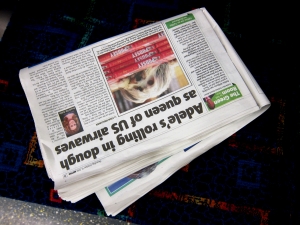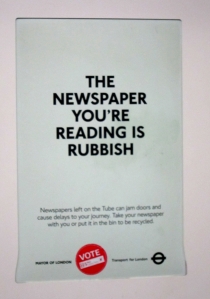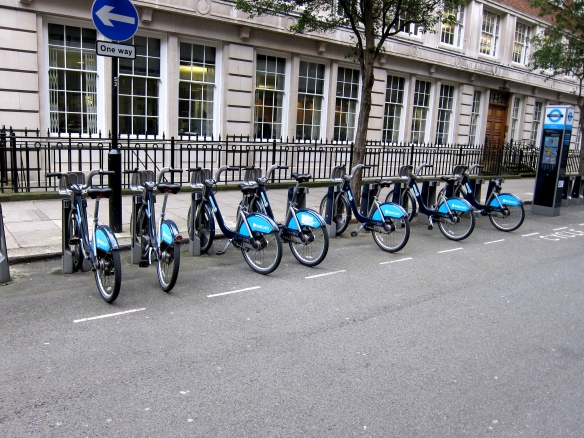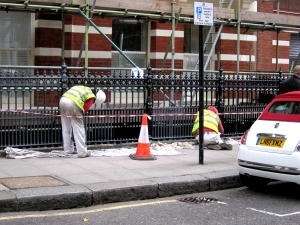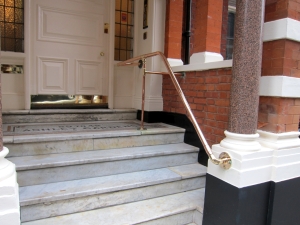Early this morning I finished reading Robert Graves’ ‘Count Belisarius’, which, I have to say, I found rather heavy going. I know enough about Roman history to admire Graves’ research and his knowledge of Belisarius’ successful conquests of the Goths, the Vandals, and the Persians; and his relief and defence of Rome during the reign of probably the longest serving Emperor Justinian and his ex-prostitute wife Theodora. I don’t know enough to question any of his remarkably detailed coverage of individual campaigns and battles. Since this is an historical novel there may be a measure of invention and embroidery.
The author is evidently fascinated by warfare and its techniques, which I am not. How this, possibly the greatest, Roman general mastered the terrain, mustered and deployed his troops, and outwitted his enemies doesn’t really intrigue me. Apart from the perfidious Procopius, historians have focussed more on the military than the private man. Procopius was one of the tools of the jealous emperor in the Count’s ultimate betrayal and downfall. Graves has done what he could to fill in our sense of the man, his wife, Justinian, and Theodora. He refrains from Gibbon’s salacious descriptions of the notorious empress. I am, nevertheless, pleased to have read ‘Count Belisarius’, whose name lives on in the prolific US television output of Belisarius Productions.
Somewhere, sometime, in the past year or so, I have read an observation that journalists do not make good writers of literature because they do not use the long sentence. The view was that they are so accustomed to writing immediate, almost staccato, prose that they cannot produce other than short sentences. Like this. Be that as it may, whoever awarded E. Annie Proulx the Pulitzer Prize for ‘The Shipping News’ must not have agreed. Robert Graves, on the other hand, perhaps because he wrote in the first half of the twentieth century, is a long-sentence specialist; that is he manages to string a great many words together, making full use of punctuation – and relying quite heavily on dashes – before allowing himself the luxury of the full stop that brings that particular sequence of words to an end. I trust the journalist Lynne Truss, who wrote ‘Eats, Shoots And Leaves’, an attempt to address the importance of punctuation, would approve of Graves’ scholarly work. Probably.
Jessica was once told by one of her teachers that she and her schoolmates were the last literate generation. I do not believe this bt i mst say txtgs ment tht 4 sur mny pepl 2dy do rite mssgs brfly im not v g at it as u cn c n pncttns gon out th wndw
I am, of course, of the Ronnie Corbett school of narrative. Ronnie, an absolutely splendid comedian, who was very short, would sit on an overlarge chair and tell a long-winded story which went all round the houses, rambling all over the place before he got to the point. Shameless. He was.
Having finished the book I took a last walk towards Wimbledon via Mostyn Road as far as the John Innes Park and recreation ground, through which I travelled, emerging by way of Blakesley Walk onto Kingston Road, turning right there and along to Morden Road; meeting Jackie at Safestore where we purchased our cardboard boxes for the move.
The Listener puzzle mentioned yesterday has been accepted.
We lunched on leftovers from last night’s jalfrezi and began our packing. As a break from taping together and filling large cardboard boxes, making sure in the process that I would be able to lift them, I had my last shop in Morden’s Lidl.  This had me reflecting that my first trip there had been when we were moving in here and found ourselves without mugs for coffee. Now we will have a dishwasher the extra four mugs I bought then will come in useful. As you know, you need more of everything in order to fill the machine. I don’t like bananas by the way, but you never know what you’ll find in this emporium.
This had me reflecting that my first trip there had been when we were moving in here and found ourselves without mugs for coffee. Now we will have a dishwasher the extra four mugs I bought then will come in useful. As you know, you need more of everything in order to fill the machine. I don’t like bananas by the way, but you never know what you’ll find in this emporium.
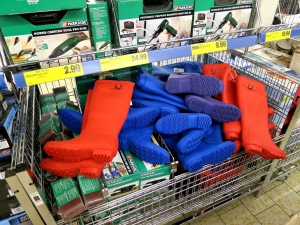 Just think, I could have bought my Wellies in Lidl. Have no fear, there is a Lidl at Totton, a suburb of Southampton not far from Minstead.
Just think, I could have bought my Wellies in Lidl. Have no fear, there is a Lidl at Totton, a suburb of Southampton not far from Minstead.
This evening, in our continuing attempts to empty the freezer we ate a melange of cottage pie (for one) and beef stew (for one), with Lidl veg. Jackie drank Hoegaarden, whereas my preference was for Roc des Chevaliers Bordeaux Superieur 2010.
